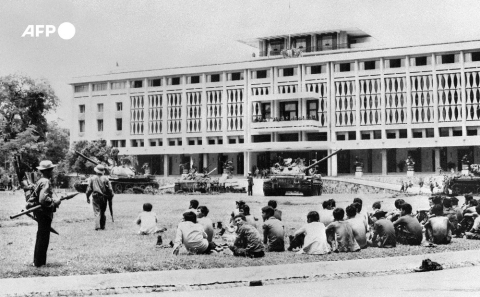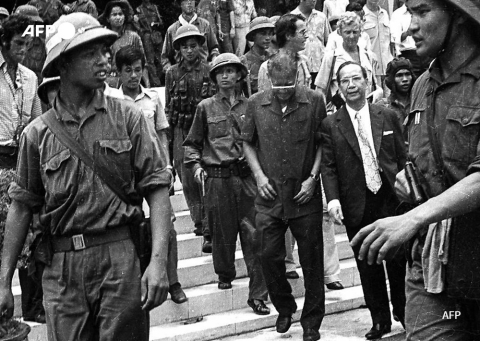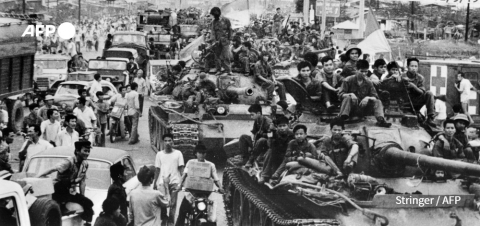Saigon surrenders: a personal recollection

by Charles-Antoine de Nerciat
Charles-Antoine de Nerciat covered the Vietnam War for Agence France-Presse. He witnessed Saigon's surrender to the North Vietnamese on April 30, 1975. This is his story.
It was a little before 8:00 am on Wednesday the 30th of April, 1975.
I stood outside the US embassy in Saigon watching a giant Chinook helicopter corkscrewing up above the rooftop of the white and windowless compound.
I did not quite realise that history was unfolding right there before my eyes: that helicopter, it turned out, was the last flight in a tumultuous 19-hour evacuation of Americans and of those Vietnamese who managed to flee as Hanoi's troops were poised to overrun South Vietnam's terrified capital.
On board were 11 US Marines, the rear guard of the task force which had guarded the airborne evacuation to ships of the Seventh Fleet in the South China Sea. They were the last US ground forces in Vietnam.
The beating of the helicopter's blades was barely audible. Or so I thought, as my attention had drifted to the crowd that had smashed its way through the now unguarded gates of the compound.
As the looting began I turned around and headed for the office of Agence France-Presse, Rue Pasteur -- a 10-minute stroll from the embassy, walking past the gates of Saigon's bulky greyish presidential palace.
It was there that General Duong Van Minh had hurriedly been installed on Monday as South Vietnam's leader, in the hope that the communist North might accept a negotiated settlement with him.
But in the hours following his appointment, Saigon was shaken by a heavy rocket attack, leaving "Big" Minh, as he was known because of his size, in no doubt as to what the communist response was to be.
Emissaries dispatched to meet a delegation of the Vietcong, Hanoi's southern guerrilla allies, had returned meanwhile with the confirmation that there would be no deal.
- 'He surrenders' -
It was 10:15 am by now. "Big" Minh's raspy voice came over the radio and AFP's two interpreters began silently jotting down notes.
Suddenly, one of the two, a young man, whispered softly: "He surrenders."

Jean-Louis Arnaud, the bureau chief, and I rushed to the telex room.
Hardly had we flashed out South Vietnam's capitulation announcement than a young telex operator darted out of the room. She wanted to leave the country, she said, making her way to the door without even bothering to pick up her handbag.
How and where to? The girl had no idea. She was almost incoherent.
We managed to calm her down and to bring her back to her telex machine to help report the tail end of Vietnam's 30 years at war.
Her panicked reaction was no exception. As the US evacuation was underway, with helicopters landing on rooftops and escort jets screaming overhead, people would suddenly walk out of their homes or their offices in a desperate effort to join the flight.
Among them were military and government officials of South Vietnam's US-backed regime, as well as people who had been employed by various American agencies.
Like AFP's telex operator, many others felt threatened as rumours of communist massacres spread like wildfire along with tales that unmarried girls would be forced to yield to the victorious army's war invalids.
At the US embassy, reporters had seen parents holding up their children and begging Americans to take them over the fenced walls of the compound. At the nearby Tan Son Nhut airport, Marines in full battle gear had pushed back swarms of people but the crush was such that some made it to helicopters there.
By the time "Big" Minh broadcast his address over the radio, this was all finished.
After a dramatic storm during the night that had made the evacuation, codenamed Frequent Wind, even more apocalyptic, a thin drizzle had set in over the exhausted city of up to four million.
Small groups of Vietnamese, having failed to make their escape, were trundling back to their homes, carrying small bags hastily packed for a planned flight overseas.
The looting that had been in full swing throughout the evacuation, with the homes and offices of those leaving systematically emptied and goods and furniture carried away on cyclos -- Vietnam's rickshaws --, bikes or cars, many of them also stolen, had come to an end.
- Bo Doi in a final push -
And, as Hanoi's Soviet-made tanks and Molotova trucks, packed with "Bo Doi" (North Vietnamese foot soldiers) began their final push, defeated South Vietnamese soldiers converged on downtown Saigon, stripping off their uniforms and throwing their weapons in the otherwise almost empty streets.

Then the rain stopped and shortly after noon a squadron of tanks rumbled down that same avenue leading to the palace where a little more than four hours earlier I had watched the last American soldiers take off.
The lead tank crushed the gates and burst into the palace grounds. "Bo Doi" troops in jungle green fatigues and pith helmets jumped off and raced to the building where "Big" Minh, in a dark blue safari suit, was waiting.
At 12:15 pm, it was all over, and the Vietcong's blue and red flag with a golden star was hoisted on top of the palace compound.
A little while later, Radio Giai Phong (Liberation), which had broadcast communist victory bulletins and political propaganda throughout the war, was on the air.
Our interpreters translated: "The forces of the National Front of Liberation (the communists' front organisation) have taken control of Saigon. Have no fear. You will be treated properly."
Saigon, the radio continued, would have the honour to be renamed Ho Chi Minh City, after Vietnam's independence hero, who had died in 1969.
Jean-Louis and I went to the telex room to file again. To no avail, communications with the outside world had been cut off.
